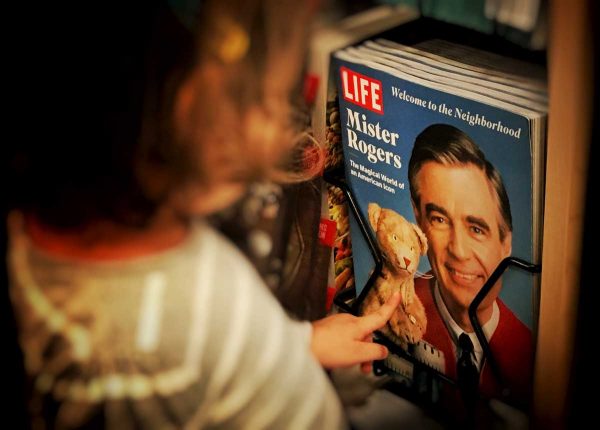
“I feel that if we in public television can only make it clear that feelings are mentionable and manageable, we will have done a great service for mental health.”
Fred Rogers
I have been thinking a lot about Mister Rogers lately. It seems that with little ones in our home, we watch Mister Rogers’ Neighborhood or Daniel Tiger’s Neighborhood (a Mister Rogers spin-off) every day. And with the recent movie release of A Beautiful Day in the Neighborhood, based on the real-life relationship of Fred Rogers and a journalist, it seems that we are seeing or hearing about Mister Rogers around every corner of our neighborhoods again.
As I watch Mister Rogers’ Neighborhood, I am amazed by how ahead of his time Fred Rogers seemed to be with understanding children and their emotions. I recently learned that this is, in part, due to his close work with child psychologist Margaret McFarland, with whom he reviewed the television content as he developed episodes. We can learn many lessons from Fred Rogers’ work, but in this post I want to hone in on his ability to help children identify, express, and manage emotion (i.e., emotional intelligence), and how you as a parent or caregiver can help the children in your life develop these skills too.
Teach your child how to identify and express what they are feeling.
In 1969 before the U.S. Senate, Fred Rogers stated, “I feel that if we in public television can only make it clear that feelings are mentionable and manageable, we will have done a great service for mental health.” I believe this also applies to parenting and otherwise caring for children. We give our children a special gift when we teach them to identify and express their feelings.
The first step in teaching a child to manage emotions is to teach them the words to express emotion. There are some simple ways to begin building your child’s emotional vocabulary. One way is reading books designed to explain and illustrate different emotions. One of my favorites is “The Way I Feel” by Janan Cain. This book goes through 13 different emotions with beautiful pictures that visually depict emotion. As you read this book or ones that are similar, you can ask your child to describe times when he or she felt the same way and give examples from your own life. Another idea is to sit down and watch your child’s favorite television show with them and label the feelings you see in the characters. You might say, “Sally looks sad,” or, “Jimmy seems to be very frustrated. What do you think?” Not only does talking about these characters’ feelings increase your child’s ability to understand their own emotional world, but it is also a key to developing empathy – the ability to understand what another person is feeling.
Give your child time to talk about what they are thinking and feeling.
During his programs, Mister Rogers often asks children questions like, “Did you talk to someone you love last night about the things you were wondering about?” He also ends every episode singing about the next time he will “meet” the children on his show: “You’ll have things you’d like to talk about. I will too.”
In my work with children, I am often surprised by how quickly I see change in children and teenagers who are just given the space to talk about what they are feeling. It’s true that in therapy we do more than just talk about feelings; We move on to find ways to create change in a child’s life. Nonetheless, acknowledging feelings is foundational, and giving a child space to talk is one of the first steps in gaining clarity on what a child is truly thinking and feeling.
This may sound simple, but in the rush of our fast-paced lives we can forget about the importance of listening. A good way to solve this problem is to create a listening ritual, a regular time every day when you take time to ask your children about what they are thinking and feeling. This might be every morning when you drive your child to school, at dinnertime, or as a part of their bedtime routine. Having a listening ritual will not only remind you to take the time to listen to your child every day, but you will have the added benefit of developing a stronger relationship with your child.
Model for your child healthy ways of expressing and managing your emotions in daily life.
Children look to the caregivers in their lives to show them how to navigate the world. This is why modeling healthy ways of expressing and managing your emotions is so important. When you feel a strong emotion, it is almost certain that your child perceives it, whether through your words, tone, or other body language. In these situations it is much better to guide children than to leave them to make inexperienced assumptions, so children benefit when their caregiver is self aware and intentional. Practically speaking, you can do this by using words to say what you’re feeling, what caused your feeling, different possible ways of responding to the feeling, and how you are going to respond to the feeling and situation in a healthy way. Then do it. Model the healthy, mature response to your child. This is hard, by the way, because it means we need to have mature emotional responses to the world.
One of the reasons I think Mister Rogers is so special and effective is that he does this very well. He often articulates how he or his puppets are feeling in a variety of situations that impact children emotionally – everything from common everyday experiences, like making mistakes and enjoying music, to some of the hardest subjects, like divorce and the assassination of Robert F. Kennedy. Then he or his puppets adeptly talk about and act out how to handle these situations.
One of my favorite examples of Mister Rogers doing this is in the following song. He sings it in response to a situation where, as he says, “nothing seems to be working out right today”. He sings:
What do you do with the mad that you feel
When you feel so mad you could bite?
When the whole wide world seems oh, so wrong…
And nothing you do seems very right?
What do you do? Do you punch a bag?
Do you pound some clay or some dough?
Do you round up friends for a game of tag?
Or see how fast you go?
It’s great to be able to stop
When you’ve planned a thing that’s wrong,
And be able to do something else instead
And think this song:
I can stop when I want to
Can stop when I wish
I can stop, stop, stop any time.
And what a good feeling to feel like this
And know that the feeling is really mine.
Know that there’s something deep inside
That helps us become what we can.
For a girl can be someday a woman
And a boy can be someday a man.
This song is a good example because he acknowledges he is feeling mad, gives examples of healthy ways to handle anger, and makes it clear that we can choose our response to the anger. With his final line, “For a girl can someday be a woman and a boy can be someday a man”, I believe Mister Rogers is teaching that a girl or boy can grow into a woman or man – and that should be their goal – but if they do not learn the skills in this song, they may become an adult who still responds like a child. This connects to the idea of modeling that I mentioned above. Who can better teach and show children what it means to be a woman or man than the adults who are closest to them?

The more a child learns to understand and manage their emotions as a child, the greater their capacity will be to handle the emotions of adulthood, where responsibilities, problems, and consequences are considerably greater. So I ask you:
How do you model management of emotion to your children? What are you teaching your child when you have conflict with your spouse, when you are grieving the loss of a dearly loved one, when someone cuts you off in traffic, or when you are discussing politics with other adults?
Our children are watching our every move, listening to our words, and imitating us as they try to figure out how to navigate the world. We as parents and caregivers are their first and greatest teachers. We can help our children by paying close attention to how we talk about our feelings and by taking the time to explain to them how we are dealing with day-to-day problems.
As I mentioned above, these can be difficult skills to live out and we won’t do them perfectly. What we all can do is strive to do our best, and if we are struggling to help our children develop emotionally, we should admit our mistakes to our children and get help. This may mean finding a parenting mentor or seeking out a trained therapist to help you, your child, or your family.
Julie Perna is licensed marital & family therapist in the state of Oklahoma. She owns and operates her private practice, Tree of Life Family Therapy, in the OKC metro area where one of her primary focuses is working with families and teens.
